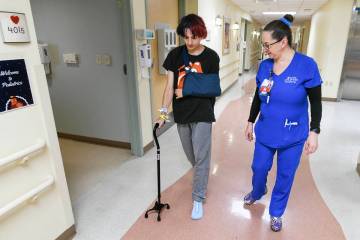Foundation offers free mental health services for immigrant communities in North Las Vegas
Psychologist Norma Ramirez can see the effects of therapy in the physical appearance of her patients.
“You can even see it as they’re coming through the process where their appearance changes. They start to look more lively and with more energy. They report that they feel more confident in themselves and that they feel prepared to continue with their life in a way that they hadn’t felt before,” she told the Las Vegas Review-Journal.
Ramirez, born in Mexico and raised in Las Vegas, is a Deferred Action for Childhood Arrivals recipient — better known as DACA — and in March, she partnered with The Immigrant Home Foundation to implement a program that provides free therapy services and immigration mental health evaluations to North Las Vegas residents over the age of 18.
DACA is an Obama-era program that provides work permits for immigrant youth that were brought to the United States as children and protects them from deportation.
The population of North Las Vegas, where the foundation is located, is 42 percent Hispanic, according to census data, a population that has historically not been able to access mental health services, Ramirez said.
More than one in five Latino adults have a mental health condition, according to the 2021 National Survey on Drug Use and Health. But as compared with the 52 percent of non-Hispanic white people who have received mental health services, only 36 percent of Hispanic and Latino Americans have received services.
There are both financial and behavioral barriers to service, including the large number of uninsured people in the Latino community, as well as racism and discrimination, according to a news release about the program.
Ramirez offers 12, 50-minute therapy sessions designed to help her clients deal with sadness, worry, grief, loss, irritability, relationship issues and trauma. She has served 10 clients so far, the majority of which have reported that the process has changed their lives, Ramirez said.
Instead of typical therapy, people with existing immigration cases can opt to choose a one-time immigration mental health evaluation to help their case. For immigration programs like the U nonimmigrant visa (typically known as a U Visa), which are set aside for immigrants who have been victims of crimes and have suffered physical or mental abuse, a mental health evaluation can be required to prove the latter. Mental abuse, Ramirez said, can be difficult to prove.
Ramirez’s clinical interviews go through a person’s history and focus on how they were affected, a service that typically costs up to $2,000.
“People tend to minimize their experience,” she said, noting that this was especially common among men. “My job is to create a safe enough space for them to be able to open up.”
This program is temporary, and aims to create a foundation for people to learn how to regulate themselves and talk about what they have been through, Ramirez told the Review-Journal. Eventually, she hopes to expand the program and continue it. She also hopes to connect with UNLV to make it a practicum where graduate students can work.
Ramirez has worked at The Immigrant Home Foundation since the program started in March, but her relationship with the organization started years ago.
She emigrated from Mexico and was undocumented most of her life until she became a DACA recipient in 2012. The more she learned about immigration services, she said she noticed a lack of therapy resources and long waitlists for that community, which influenced her desire to do such work.
But Ramirez never experienced therapy herself, and said she definitely could have benefited from a program like this one. Now, she is grateful to give back.
“It’s an honor for them to be able to trust me, and for us to work together and be in spaces in their lives that have so much vulnerability, and to work together in a way that there’s this confidence that develops,” she said.
The deadline for typical services has passed, but people can join the waiting list by calling 702-889-4431. Immigration evaluations are still open.
Contact Katie Futterman at kfutterman@reviewjournal.com.





















